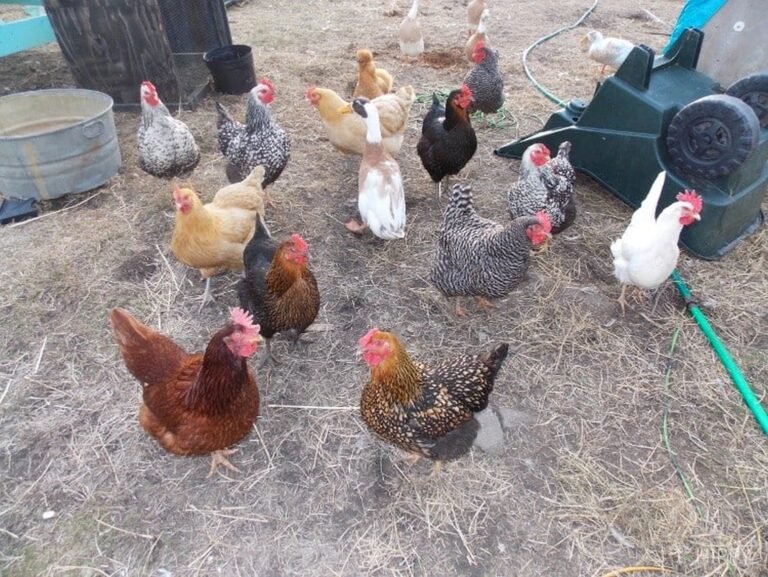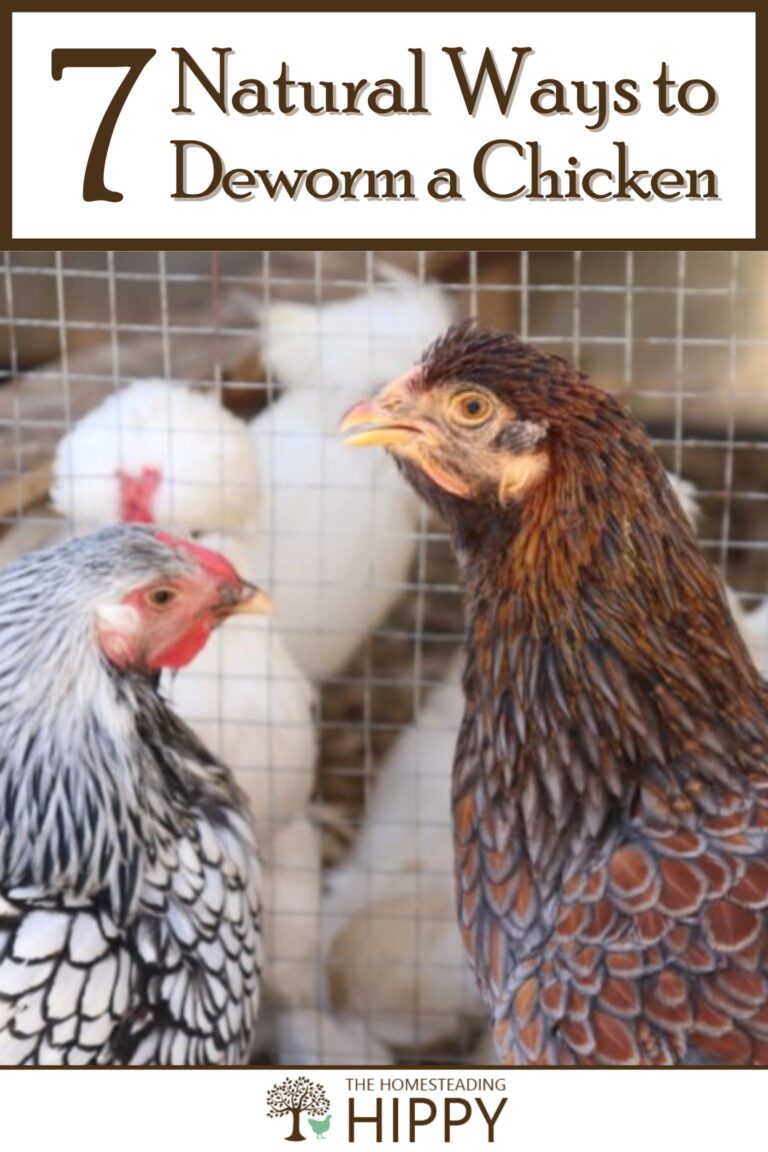Chickens, being omnivores, eat all kinds of things, including other creatures. High up on the list of a chicken’s favorite foods is a perfect, juicy, worm. That’s one of the reasons why they scratch around in the grass so much!

How ironic then that it is the chickens that fall prey to worms more often. No, not earthworms; I am talking about the parasitic kind that invades a chicken’s organs and robs them of essential nutrients or even their very blood: roundworms, threadworms, gapeworms, and the dreaded eyeworms, among many others.
Attacking the intestines, throat, or eyes of the affected bird, these pesky, nasty critters can cause all sorts of health problems for our backyard flock, including anemia, poor feathering, reduced egg production, and even death.
Worms are much more than a nuisance, and you must take the threat of them seriously.
The good news is that there are some natural ways to safely and effectively deworm your chickens so that you don’t have to resort to costly medicines or veterinary care in some cases.
In this article, we will be telling you about 7 tried and true natural methods to eliminate worms from your flock.
1. Garlic
Garlic is a potent herb used in cuisine around the world and one with many health benefits.
For our purposes today it can also be used as an effective vermifuge, or de-wormer, for our chickens.
Garlic is effective because it contains a compound that is thought to work by paralyzing the worms, causing them to be expelled from the chicken’s body since they can no longer stay in place and absorb nutrients.
The great thing about garlic in this role is that it is so adaptable: garlic can be given to chickens whole or cut into small pieces, grated and added to their usual food, or even “steeped” in their water.
To do this, just put a few cloves of garlic in a pot of hot, but not boiling, water and let it steep for 15-20 minutes. Then, remove the garlic, let the water cool, and add the garlic-infused water to your chicken’s normal water source.
This is a great way to supplement another regimen or help treat picky eaters.
Otherwise, give an adult chicken one clove of garlic per day for 10 days to two weeks and it should clear up any worms except eyeworms.
2. Pumpkin Seeds
Pumpkin seeds are a tasty snack that most chickens love, one you won’t need to work too hard to get them to eat, but they also contain compounds that are antagonistic to parasitic worms and other harmful microorganisms.
This compound is called cucurbitacin, which is thought to work by paralyzing the worms and allowing them to be expelled from the chicken’s body via excretion or, in the case of some worms, coughing them up.
To treat your chickens with pumpkin seeds, you can just hand them over raw- don’t cook them.
Your chickens will gobble them up as normal. Give your chickens two servings of pumpkin seeds a day for two weeks or longer for the best results.
Take care that affected birds do indeed eat the seeds since greedy ones might scarf them up before they get some!
For smaller birds that might struggle to eat them, simply grind the seeds up coarsely in a food processor and add them to feed or serve as is.
3. Cucumber Seeds
Cucumber seeds work very much like pumpkin seeds since they both contain cucurbitacin. This makes sense since cucumbers and pumpkins are related, if distantly, to the family of vegetables they occupy.
Just like with pumpkin seeds, simply feed your chickens raw cucumber seeds each day until the worms are gone, or give them plenty of fresh cucumber slices or bits.
Compared to pumpkin seeds, cucumbers don’t contain as much cucurbitacin but they do contain enough to work.
And as with the pumpkin seeds above, don’t cook them! Cooking degrades the compounds that do the work on the worms.
Cucumber seeds are much smaller than pumpkin seeds, so don’t be afraid to grind them up and add them to feed or other food if needed.
Since cucumbers are a great source of water and vitamins for chickens while being low in calories this makes them a great option for dealing with parasitic worms as a usual and ongoing part of their diet.
4. Nettle
Nettles, particularly stinging nettles, are an excellent way to treat parasitic worms in chickens since they contain tons of compounds that have antimicrobial properties.
And don’t worry, your chickens will not be the least bit bothered by the sting of stinging nettle, though you should take care if harvesting it for them or cleaning up after it!
Like garlic above, nettle is both nutritious and highly versatile in this role. You can let your chickens eat it fresh from the ground if you have a nettle patch or grow it specifically for them.
You can also dry it and grind it into a powder to add to their feed. Steeping nettle into a sort of tea that can be added to their water is another way to ensure they get plenty of the good stuff even when they won’t, or can’t, eat it.
Nettle is also highly safe for chickens nutritionally, so long as they are eating a complete diet otherwise they can have as much of the stuff as they want. Expect at least a week’s worth of feeding before you start seeing results, though.
5. Apple Cider Vinegar
I know apple cider vinegar, or ACV as it is popularly called in health-nut circles, is proffered as a miracle cure for everything from indigestion to baldness to high-interest rates, but I promise in this case it really works as advertised, particularly against any intestinal or bloodsucking worms.
Apple cider vinegar contains acetic acid, which kills off or disrupts worms by making the chicken’s digestive system too acidic for the worms to survive.
It may or may not actually kill the worms but if it doesn’t it will render them unable to complete their life cycle and lay eggs, effectively halting their multiplication.
This makes apple cider vinegar a great way to start getting a handle on an infestation before it morphs into a full-blown outbreak among your whole flock.
Now, vinegar is not something that chickens need, and that includes our ACV here. Because of this, we must be cautious in its use lest we do more harm than good.
The best way to administer apple cider vinegar as a dewormer is in your flock’s water source. This way all of them will get the medicine so long as they can and will drink.
A good rule of thumb is to start with 1 tablespoon per gallon of water, given for 1 week out the month before observing for effect.
Do not administer straight ACV in bread or by dropper, and don’t increase the ratio of the solution above as a quick fix.
This stuff will play a bit of hell on a chicken’s gut flora and can be hard on their kidneys in high concentration. You might need to manage that, which we will talk about later.
6. Diatomaceous Earth
Diatomaceous Earth, commonly abbreviated DE, is a naturally occurring material that is sold as a fine but abrasive white powder. This powder is composed of the fossilized remains of microscopic sea creatures called diatoms, hence the name.
This stuff has all kinds of uses around the home and garden, usually as a pest control agent, though chickens can benefit from it for dealing with external parasites, as a grit additive, and also as a dust bath component.
DE is an effective chicken dewormer because it physically scrapes and perforates worms and other parasites when it contacts them, the same as it does with bugs out in the world or fleas hiding in your chicken’s feathers.
Once the parasites have been lacerated, they will either leak vital fluids else dehydrate, and either way they die. Mission accomplished!
The easiest way to use DE in this way is to mix 3 1/2 ounces of FOOD GRADE DE into 2 1/2 pounds of chicken feed, then let them eat as normal. Don’t fret; this stuff won’t hurt your chickens at all and they will eat as normal.
7. Verm-X Solution
This is an over-the-counter, all-natural deworming product that works wonders, and combines several known botanicals that are harmful to parasites.
It can be administered in a variety of ways, either by soaking dry food in it, given directly via a dropper, or mixed with water.
Some wormers will require you to treat for a week or two and then take a week off, but Verm-X can be given continuously with no harm to your chickens.
This is great news because it means you don’t have to constantly be on the lookout for parasites and can simply prevent them in the first place.
Even better, it will not disrupt or harm laying hens or affect their eggs (though some parasites, namely roundworms, might try to escape into the chicken’s oviduct!).
And, if you can believe it, it is also safe to use in conjunction with most anti-parasite medications, meaning that you can combine treatments for a potent one-two punch. As always, ask your vet for certainty, though.
If there is one downside with this stuff it is that it is pretty spendy and is produced in the U.K., so it might cost a bit to get it shipped to you. Still, many owners swear by its effectiveness, so if you can afford it this could be a great solution for your flock.
Give Worms the Boot Naturally
It is possible to get rid of chicken worms naturally, without the use of harsh chemicals or medications.
While some cases might require veterinary help, often a combination of natural treatments can be just as effective and much safer than chemical wormers.
With a little bit of know-how and effort, you can eliminate worms from your flock for good.

Tom has built and remodeled homes, generated his own electricity, grown his own food and more, all in quest of remaining as independent of society as possible. Now he shares his experiences and hard-earned lessons with readers around the country.
Find out more about the team here.
